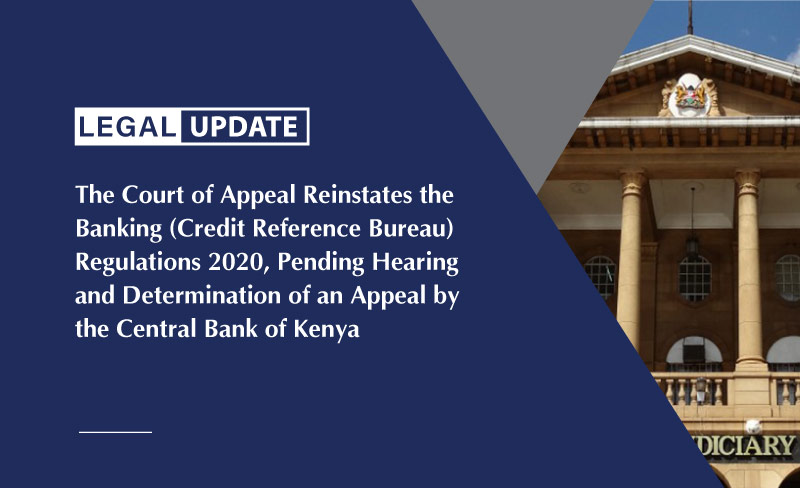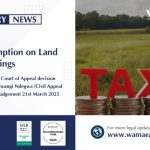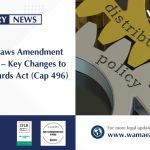INTRODUCTION
Further to our article titled “The High Court Nullifies The Banking Credit Reference Bureau Regulations 2020” published on 20th September 2023, we wish to apprise you of the latest developments.
PROCEEDINGS AT THE HIGH COURT
On 28th August 2023, the High Court (Hon. Lady Justice Mugure Thande), nullified the Credit Reference Bureau Regulations 2020 for failure to comply with Section 11 of the Statutory Instruments Act, which requires all statutory instruments to be tabled before the relevant house of parliament within 7 days from the date of its publication.
The resultant effect of the Judgment was that the entire Banking (Credit Reference Bureau Regulations) 2020 (CRB Regulations 2020) were void by operation of the law and had no legal effect.
PROCEEDINGS AT THE COURT OF APPEAL
Ostensibly, the Central Bank of Kenya (CBK) was aggrieved by the High Court judgment and preferred an Appeal to the Court of Appeal challenging the entire decision. The CBK sought two substantive orders. First, that the Court of Appeal stays the execution of the judgment and decree of the High Court pending the hearing and determination of Nairobi Civil Appeal No. E782 of 2023, which it has filed against the said decision.
Secondly, the applicant sought that pending the hearing and determination of its appeal, the Court issues an order to suspend the declaration issued by the High Court that the CRB Regulations 2020 are null and void for non-compliance with section 11 of the Statutory Instruments Act, 2013.
CBK’s argument was that the appeal would be rendered useless if the stay sought was not granted since the entire credit information sharing framework had been thrown into total disarray and the applicant could not enforce or implement the said Regulations.
Further, CBK argued that as a result of the High Court judgment, there is now a lacuna in the law, particularly in respect of three areas, which necessitated the review of the CRB Regulations 2013 namely:
- minimum threshold for negative credit sharing information submitted to Credit Reference Bureaus (“CRBs”) in Kenya;
- granting of CRB clearance to first time job applicants seeking employment in public and private entities;
- onboarding of other financial services sector players including SACCOS
On the other hand, the Respondent was of the view that should the intended appeal succeed, it shall not be rendered nugatory as the dispute involves a constitutional issue which can be maintained or reversed depending on the outcome of the appeal.
The Court of Appeal found that indeed, CBK’s appeal was arguable. Secondly, the Court found that the effect of the High Court’s decision is that there are now no Regulations in force relating to CRBs. According to the Court of Appeal, the High Court’s decision threw the Credit Information Sharing Framework into total disarray and rendered the CBK unable to perform its statutory role of regulating CRBs.
As such, as a result of the decision, there was a gap in law relating to credit sharing information submitted to Credit Reference Bureaus in Kenya, among other public functions. Lastly, the Court found that it was in public interest to grant the orders sought as the general public would suffer irreparable harm in light of the gap in law caused by the Judgment of the High Court, in the event CBK’s Appeal succeeds.
Therefore, the Court of Appeal allowed CBK’s Application and suspended the High Court Judgment pending the hearing of CBK’s Appeal.
IMPLICATIONS OF THE RULING
The ruling has reinstated the CRB Regulations 2020, meaning that the regulations are in force and can be implemented pending the hearing and determination of CBK’s Appeal. Notably, key parties in this sector that shall be affected by the decision are non-deposit taking Microfinances and SACCOs, who are now regulated by the CRB regulations 2020. Therefore, their Credit Information Sharing and listing must comply with the CRB regulations 2020. Additionally, the minimum listing threshold has reverted back to Kshs. 1,000.00.
We will continue monitoring further developments and note to update on any further changes and their implications.
This article is provided free of charge for information purposes only; it does not constitute legal advice and should be relied on as such. No responsibility for the accuracy and/or correctness of the information and commentary as set in the article should be held without seeking specific legal advice on the subject matter. If you have any query regarding the same, please do not hesitate to contact Litigation Department at Litigation@wamaeallen.com
 Loading...
Loading...
About the author
Kennedy has gained his experience in the arena of Dispute Resolution by acting for and advising both local and international clients in a myriad of disputes and preparation of various agreements. Over his years of practice, Kennedy has engaged in complex and high value litigation before the Court of Appeal, High Courts, as well as Quasi-Judicial Tribunals such as the Public Procurement Administrative Review Board, Tax Appeals Tribunal and international dispute resolution bodies.
Frankline M. Otieno is a dispute resolution associate, recommended professional and committed to offering sustainable client-centred solutions to legal issues.
Frankline is astute in commercial litigation, securities law, banking law, intellectual property litigation, public procurement, land law litigation, Judicial Review and Administrative law litigation, sports law, tax litigation, administrative law, consumer protection law, competition law and constitutional litigation.
Ogolla Omondi Elvis is an Associate in the Commercial, Conveyancing & Real EstateDepartment and specialises in banking & finance law, securitization, general property law,
company and corporate law, legal compliance, joint ventures, business formations and general commercial transactions.
He has a wealth of expansive experience, knowledge and essential comprehension of the legal frameworks relating to the property and commercial sector in Kenya.
Elvis has been involved in providing corporate and commercial advice to clients in a wide range of sectors.
Elvis further has an experience with fintech in their particular spaces.













